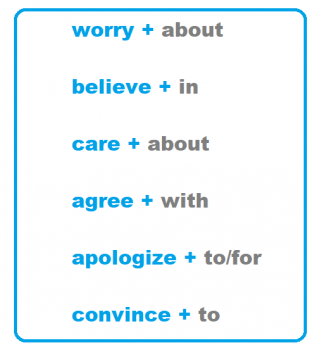Verbs and their prepositions in English Posted by carol on Jul 31, 2018 in English Grammar, English Language
Hey guys! Are you doing okay these days?
As in many languages, some verbs in English require a specific preposition to come up after the verb in a sentence in a certain context. But there is no need for alarm, you do not have to memorize any of them. All you have to do is keep in mind that that best way to improve your language skills is to always practice, read as much as you can and, of course, keeping up with our blog content! Eventually, it will come out naturally. Today’s post is a way of helping you learn some verbs and their prepositions in English!

Worry (about something)
- Many Brazilians are worried about their upcoming presidential election this October.
- Parents always worry about their children’s well-being.
- You should try not to worry about things that are beyond your control.
- I started worrying about money when I lost my job.
Believe (in something)
- After she lied to me, I just can’t believe in anything else she says
- When children grow up, they stop believing in Santa.
- It is getting harder and harder each day to believe in the promisses politicians make.
- Du you believe in aliens?
Care (about something)
- I really don’t care about what other people think about me.
- The doctor told the patient to care more about his health.
- Big companies only care about money.
- We don’t care about the price, we just want the best product we can get.
Agree (with someone/ about something)
- I perfectly understand what the professor is saying, but I don’t agree with him.
- Thankfully, the boss agreed with my suggestion to put off the meeting until next week.
- Why don’t you ever agree with my opinions?
- Not many journalists seem to agree with Donald Trump’s controversial politics.
Apologize (to someone/ for doing something)
- The students apologized to the teacher for having disobeyed the classroom rules.
- Ladies and gentlemen, we apologize for the delay in the flight.
- The actor publicly apologized to his fans for the misunderstanding.
- I apologize for any inconvenience.
Convince (someone/ to do something)
- The attorney convinced us to believe in the innocence of the defendant.
- It was late, so my guests convinced me to stay at their place overnight.
- He finally managed to convince the investors to loan him the money.
- I still can’t believe Josh convinced you to move in with him.
Have a good week!

Keep learning English with us!
Build vocabulary, practice pronunciation, and more with Transparent Language Online. Available anytime, anywhere, on any device.
Share this:



